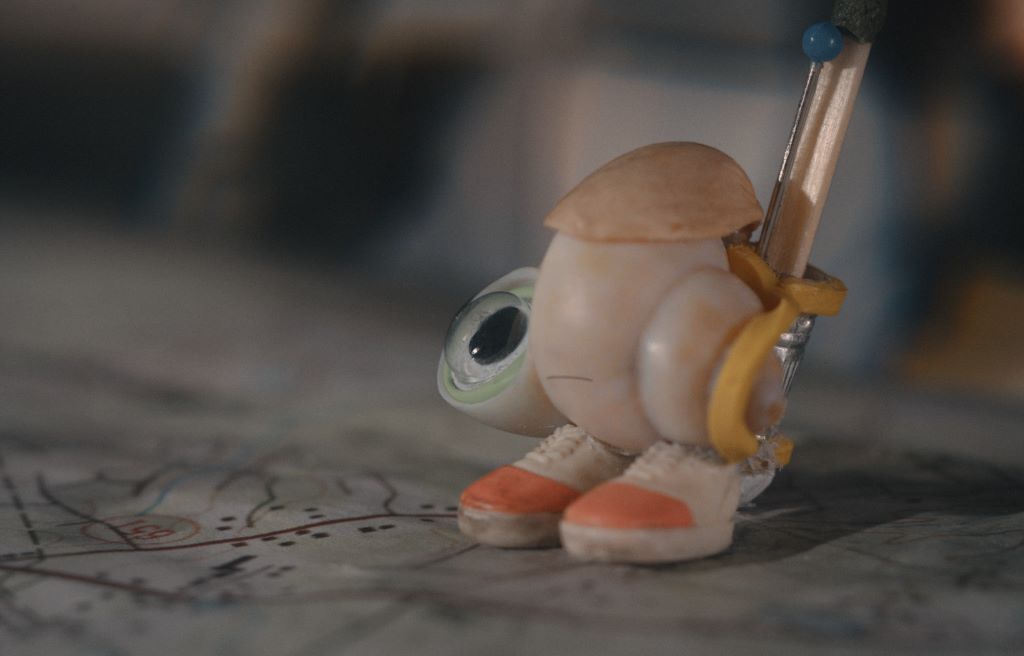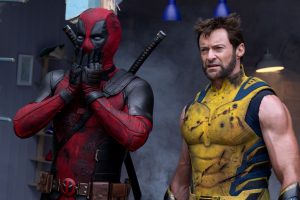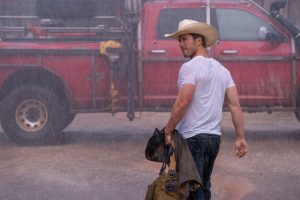Reviews include Deadpool & Wolverine, Doubles, and Mountain Queen: The Summits of Lhakpa Sherpa.
TFCA Friday: Week of July 1
July 1, 2022

Welcome to TFCA Friday, a weekly round-up of film reviews and articles by TFCA members.
In Release this Week
Attack on Finland (dir. Aku Louhimies)
“While the hostage crisis is the bait that will reel audiences in, Attack on Finland plays out more along the lines of White House Down and Olympus Has Fallen than it does Die Hard,” says Courtney Small at That Shelf. “As Tanner embarks on a covert mission to hunt down the individuals responsible, Louhimies’ film features all the expected action beats. Pulling from some of the staple tropes of the genre, Attack on Finland includes scenes where hostages are dressed like criminals to confuse law enforcement, a thrilling nighttime car chase scene, and plenty of close-range shootouts, etc.”
“Aku Louhimies’ Attack on Finland or Omerta offers perspectives on something we’ve learned in Russia’s war on Ukraine, that Finland is not a member of NATO (yet), so has no protection from Europe against Russia on its eastern border,” writes Anne Brodie at What She Said. “It’s ambitious and dense, a tad too long, but offers an insider’s look at the body politic of northern Europe.”
“Attack on Finland has admirable ambitions, but an excess of storylines, characters, and excursions down diverging paths weigh down what might have been a gripping political thriller,” sighs Thom Ernst at Original Cin. “But the most damning hiccup in the film is the decision to dub the dialogue into English. Not even the advanced technology of facial altering computer-generated lip-synching can smooth out the jarring effect of voices that simply do not match the speaker.”
Beba (dir. Rebeca Huntt)
“While Huntt has fair motivation, this self-portrait of her coming-of-age is a tale of raising oneself by stepping on the backs of others. The cinematography by Sophie Stieglitz is striking, but it can’t mask Beba’s biting cruelty and underlying ugliness,” writes Pat Mullen at POV Magazine. “The film’s a reminder that one must afford respect to others before demanding it from them. Beba is the self-indulgent narcissism of contemporary selfie culture taken to extremes.”
Blasted (dir. Martin Sofiedal)
“Blasted is The Hangover meets Attack the Block,” writes Gilbert Seah at Afro Toronto. “The film is so outlandishly silly that one cannot help but watch it to the very end.”
Endangered (dir. Rachel Grady and Heidi Ewing)
“These scenes are sights that audiences have seen too frequently while doomscrolling the Twitter feed amid the mental health disaster of the past few years,” writes Pat Mullen at POV Magazine. “However, these on-the-ground glimpses are urgently compelling even if they’re familiar. Caught from the front lines, these reporters show the distinct alternate realities that exist in contemporary times. However, the images are also objective, empirical call-outs to the misinformation spread by leaders. Good reporters keep their receipts, and Endangered lays them all on the table.”
The Forgiven (dir. John Michael McDonagh)
“It’s an intriguing slice of moral ambiguity, though it does feel a touch simplistic, with its cast of immoral (or at least amoral) Brits interacting with their supposed inferiors, the locals,” admits Chris Knight at the National Post. “The actors pull the material as taut as they can, but the story still sags in the middle.”
“A stark portrait of haves and have-nots, whose faces are constantly rubbed in their traditions by drunk, high, sex-mad, wasteful, and lax outsiders, and how those cultural and moral tensions shape the story,” writes Anne Brodie at What She Said. “Ralph Fiennes and Jessica Chastain are David and Jo, en route to the weekend bash at the villa in Asni, a 400-mile drive. He’s been drinking all day, it’s dark and they’re arguing when he strikes and kills a boy, there to sell them a fossil.”
“The Forgiven is a film that contains a deliciously wicked black story about very bad people that should never be forgiven – the kind of premise that makes the best movies,” says Gilbert Seah at Afro Toronto.
“McDonagh’s sumptuous version of the novel…is utterly faithful and thus note perfect, capturing its resonant ruminations on social inequity, racism, and cultural tourism in a sweeping Moroccan desert Sheltering Sky novelist Paul Bowles would recognize,” notes Kim Hughes at Original Cin. “Those who have read Osborne’s slight but gripping novel might wish there had been some way of better reflecting the rich inner dialog of its characters. It’s no wonder the author has been compared favourably to Graham Greene, who also managed to make fictional people seem wholly three-dimensional and relatable in ways that are often uncomfortable.”
Marcel the Shell with Shoes On (dir. Dean Fleischer-Camp)
“Move over, Tom Cruise, and make way for Jenny Slate as the voice of Marcel, a shell with, um, shoes on,” advises Chris Knight at the National Post. “[Y]ou can also sink into the quietude of the story, the moments where Marcel describes the comfortable feeling of being able to rest when there’s a party going on in your house, lulled by the noise of other voices. Or the notion of feeling blue, and knowing that this might be a lovely time you could enjoy – if only you were someone else. I’m sure even Maverick has days like those.”
“A really fresh idea that is stretched a bit too long its a full length feature, the film still has its charm, mild humour and odd-like animation, thus garnishing it at the time of writing a 100% approval on Rotten Tomatoes,” notes Gilbert Seah at Afro Toronto.
“There was a lot of that ‘the film we need now’ commentary when Marcel screened at the Telluride festival last fall, as if we all need the same thing, which is overselling it. At times, the film is unabashedly cloying, like an ASMR Forest Gump or a Minion with sensitivity training,” admits Liam Lacey at Original Cin. “But if you can get past that, there’s an admirable ingenuity to the technique, integrating live action and stop-motion with humour and an easy, natural flow.”
“You will cry, your children will cry, and the theatre workers cleaning up your mess during the credits will probably cry, too (and not just for the usual reasons). After so much time spent barely keeping it together on our own, Marcel the Shell with Shoes On provides an opportunity for all of us to break down, together,” sobs Barry Hertz at The Globe and Mail. Hertz also chats with star Jenny Slate about making a mollusk movie with her ex and harnessing the power of a good cry. “What happens when you’re together, but moving apart?” says Slate. “I also want to do comedy, but I’m starting to feel sad about having to separate comedy from large, soft, kind emotions. We wanted to see how much of that could live in this space of this small character.”
“The success of Marcel the Shell with Shoes On is due in large part to the balance the film strikes,” observes Rachel Ho at That Shelf. “It never gets too cute or too twee that the characters or story become cloying. And while Camp’s direction and performance has a lot to do with achieving this, Slate’s vocal work is the biggest reason it works. There’s a gentleness in her tone blended with an assertiveness that gives Marcel a texture we can feel. It should also be mentioned that the quick banter and chemistry between Camp and Slate also goes a long way in making this quirky indie pop.”
Minions: The Rise of Gru
(dir. Kyle Balda, Brad Ableson and Jonathan del Val)
“There’s not much meat to the Minions’ thematic bones – and surprisingly, the movies have never tried to go the musical route, even though We Don’t Talk About Gru, No No No is just sitting there as a No. 1 hit possibility – but there are far worse ways to kill 90 minutes of child care,” admits Barry Hertz at The Globe and Mail.
Mr. Malcolm’s List (dir. Suzanne Allain)
“Narratively-speaking, the film doesn’t provide us with anything new or shocking,” admits Rachel Ho at That Shelf. “The story plays out how one would expect, but it doesn’t make the film any less entertaining. For those who enjoy period pieces and/or romantic comedies, Mr. Malcolm’s List delivers on the touch-points that make the genre enjoyable to so many.”
“Of the many attributes of Mr. Malcolm’s List, its colour-blind casting is far and away its best, with Black, brown, white, and Asian actors simply presented as they are, often as relatives, without undo explanation. The film is also elevated by its attention to period-specific detail, and the vibrant use of colour in everything from costumes to sets,” says Kim Hughes at Original Cin. “So, here we have a genuine grassroots thing, and a bona fide collaboration, resulting in a pleasant if predictable movie filled with actors that are easy on everyone’s eyes and an ending that Ms. Austen would approve.”
“Were you seduced by Bridgerton? Well, settle in for Mr. Malcolm’s List, in theatres now, a period British society dramedy that’s not as overtly sexual but just as biting in its observations,” advises Anne Brodie at What She Said. “Like Bridgerton, the enthusiastically diverse characters of London society back then is reason to celebrate. Watch for Ashley Park who appears as an hysterically funny, ridiculous woman who has lost her fortune and needs a man fast.”
The Passengers of the Night (dir. Mikhael Hers)
“Not having great moments of screen catharsis also puts a lot of pressure on the actors, even though we’re aware that things we’ve seen in previous scenes have been challenging for them, observes Karen Gordon at Original Cin. “This is particularly true of Charlotte Gainsbourg, who is eminently watchable and brings a quiet grace to her performances. Her character doesn’t have a big scene where she comes to terms with her past, but we see over the span of the film, that she’s moving forward and making a life for herself, and in her own way keeping true to what’s important to her and her family. The moral: There’s a quiet joy in ordinary life.”
“Passengers of the Night is an easy flowing yet effective family drama in which a family hears and grows from a stranger in their lives,” observes Gilbert Seah at Toronto Franco.
“It’s a lovely slice of French life, with some well written, well performed characters,” writes Chris Knight at the National Post. “Gainsbourg in particular is effective at giving the film an emotional core and a beating heart, and Abita excels as the young Talulah, uncertain about how to make her way in the world. Makes me wonder where these ’80s character would be today. I hope they did well.”
“Gainsbourg is phenomenal.” – Anne Brodie, What She Said
The Princess (dir. Le-Van Kiet)
“The story’s chock-a-block with gruesome murders, and high body count, so again, the stereotype is gone, and we marvel at King’s relentless energy and discipline, imaginative moves and close calls,” notes Anne Brodie at What She Said. “I’ll leave it there only to add that there is room in the princess canon for a determined warrior who fights pure evil to prevent a violent dictatorship.”
“The Princess should just marry Julius, who is actually quite dashing, secure her kingdom, thus saving herself of all the trouble and deaths as well as sparing the audience this awful ordeal of a film,” groans Gilbert Seah at Afro Toronto.
The Best of 2022! The Best of Canada!
At That Shelf, Rachel Ho, Pat Mullen, and Courtney Small join other writers in picking the best films of 2022 so far. What’s top their lists? For Ho, it’s After Yang: “a meditative film that gives beauty to the small, cherished moments in life and asks us to rethink what it means to be alive.” For Mullen, it’s Fire of Love: “an invigorating, deeply philosophical essay about confronting the unknown as tectonic plates shift beneath your feet.” And for Small, it’s Everything Everywhere All at Once: “Move over Marvel and DC, The Daniels have set the blueprint for how to successfully tell a story involving a multiverse.”
At The Globe and Mail, Barry Hertz surveys Canadian filmmakers for long weekend streaming recommendations from the folks who make movies. Here’s Scarborough director Shasha Nakhai on why you should see Islands: “I’ve been waiting so long to see Filipinx representation like this in the Canadian film landscape. It’s the little things – the details in the set design, playful editing, and quiet confidence. It doesn’t hurt that the filmmakers are such lovely people, too – it makes me root for this film even more.”
In Conversation With…
At Zoomer, Marriska Fernandes chats with Elvis Baz Luhrmann about the King’s longevity and casting Austin Butler in the role of a lifetime: “[F]rom the moment Austin walked in, he was pretty much quite down the Elvis road, he already sounded like him and studied some of the mannerisms,” says Lurhmann. “At some point, I think his soul and Elvis’ kind of just melded because what you don’t want is impersonation because Elvis is the most impersonated man on the planet. You want an interpretation.”
At POV Magazine, Pat Mullen chats with Canadiana co-creators Ashley Brook and Kyle Cucco about the return of their web series that frames national history through a cinematic and inclusive lens. “We try to include as much of the context and as many characters as possible,” says Cucco. “For example, the first episodes tell a story about pirates, and the dangers of the St. Lawrence. The North Atlantic at the time saw France and Britain fighting each other, but also the Mi’kmaq fighting the invasion of the colonists. We’re trying to tell the stories that aren’t so much in the broad strokes of the history books.”
At The Globe and Mail, Barry Hertz reports on the news that eOne Films/Les Films Séville will no longer release movies theatrically: “Whereas eOne once distributed dozens of films a year in the country – including such indie Hollywood hits as If Beale Street Could Talk, Molly’s Game, La La Land and Sicario, plus a reliable wave of Canadian cinema from such leading homegrown filmmakers as Philippe Falardeau, Xavier Dolan and Kim Nguyen – the company’s theatrical output has since slowed down to a trickle, even discounting the pandemic. Last year, the company distributed just six films theatrically, with only one English-language title, Clifford the Big Red Dog, hitting the big screen.”
Also at The Globe and Mail, Hertz shares the news that the Toronto International Film Festival filled at least one donut hole in its line-up with Glass Onion: A Knives Out Story as the first film announced for the fall event. “For TIFF, the Glass Onion announcement doubles as a star-powered declaration that the festival is heading back to its bigger, glitzier pre-pandemic self after enduring two years in scaled-down hybrid mode. This past April, TIFF announced its 47th edition will be a ‘fully in-person’ affair, with 11 days of full-capacity screenings at familiar venues.”
A Festival of Festival Coverage: Viva Lavazza!
Gilbert Seah reports on some of the films screening at this year’s Lavazza Italian Contemporary Film Festival. On the Canadian flick Drinkwater, for example, he writes, “Don’t expect much from this one and you will not be disappointed.” At Toronto-Franco, he offers some Italian highlights, like Ennio: “Tornatore is the perfect director as his doc has the same feel, tone and atmosphere as his classic film [Cinema Paradiso].” He also surveys some of the international selections, like Tonbi: “Director Zeze’s film, to his credit, tries its best to stay away from sentimentality and melodrama, though not always successfully.”
TV Talk/Series Scribbles: Kenobi’s Canadianness
At Complex, Marriska Fernandes chats with The Lake star Jordan Gavaris about the series’ refreshing spin on queer representation with his turn as a single dad: “We’re not exploring the pitfalls of being, a gay, cropped-top-wearing cute boy in the country,” says Gavaris. “The biggest problem is just him trying to find his way into this relationship with his birth daughter. And that’s really nice because this will probably shock everyone but gay people have problems too, that have nothing to do with their sexuality.”
Also at Complex, Marriska Fernandes chats with Obi-Wan star Hayden Christensen and director Deborah Chow about the Canadianness of the Star Wars series and their Toronto roots. “For me having this screening here in Toronto, it just kind of brings everything full circle again. For Deborah and I to be able to end our press tour in Toronto and have it all sort of conclude here is perfect,” says Christensen. For Chow, they just clicked: “I met Hayden for the first time, just outside of Toronto,” the director tells Fernandes. “So it was really nice getting to meet him on our home turf. And I think you just have an instant bond, especially when you are living in a different country.”
At What She Said, Anne Brodie binges the latest Sir David Attenborough nature series The Green Planet: “Just phenomenal, mindbending information and entertainment and a call to preserve the ecosystem,” writes Brodie. Season 11 of Call the Midwife, meanwhile, has “no shortage of drama, joy, tears, and humour.”



